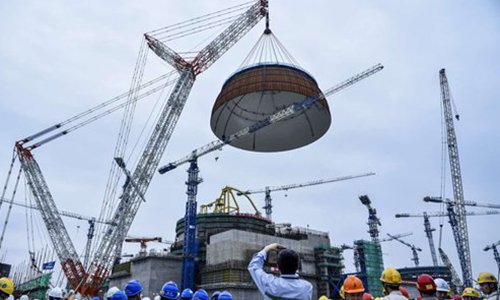SOURCE / INDUSTRIES
Leaked nuke document reveals fence-sitting mentality of Czech politicians

Engineers install parts of the first nuclear power plant using Hualong One technology in Fuqing, East China's Fujian Province in May, 2017. File Photo: VCG
Czech lawmakers have been accused of political fence-sitting after a leaked document on upgrades for its Dukovany nuclear power plant was found to have clauses that purposefully exclude Chinese and Russian nuclear firms. Chinese experts said it reflects a fence-sitting mentality of the country's lawmakers.
The top secret document revealed how the country aimed to exclude Chinese and Russian bidders from the nuclear reactor project due to national security concerns, Russian news portal tass.ru reported on Sunday, citing Czech media reports.
Plans to add a new 1,200-megawatt nuclear reactor for $5.6-$6.4 billion to the Dukovany nuclear power block is in final negotiations, with key deadlines set in May and June. Czech is phasing out older reactors from the 1980s, but expenses and budget constraints continue to thwart development plans.
China General Nuclear Power Corporation (CGN) is looking to bid on the project. The company was unavailable for comment as of Monday.
CGN is developing the Hinkley Point C nuclear power plant project in the UK with French energy company EDF.
Experts said national security concerns do not hold much ground as civilian nuclear energy use poses no such threats, and to reject Chinese bidders will cost the country economic opportunities.
Zhao Junjie, a research fellow at the Chinese Academy of Social Sciences' Institute of European Studies said the leaked document reflects a fence-sitting attitude of some Czech politicians.
"Some US forces are probably behind this Czech document," Zhao told the Global Times. "Chinese company is working at the Hinkley Point C project in the UK, and there is no outcry of national security."
"Czech's blind ideological prejudice will cost its economic interests," Zhao pointed out, noting the cost advantages that a Chinese solution offers.
The country's existing nuclear plants were built with assistance from Russia, according to the tass.ru report.
Wang Dezhong, a professor specializing in nuclear-related technology at the School of Mechanical Engineering under Shanghai Jiao Tong University, said the peaceful use of nuclear power across national borders should not stoke national security concerns.
"China uses American, Russian, and European technologies at its nuclear power plants, and it also exports its nuclear technology abroad," Wang said.
"There should be no concern for national security provided that they are civilian projects," he added.
